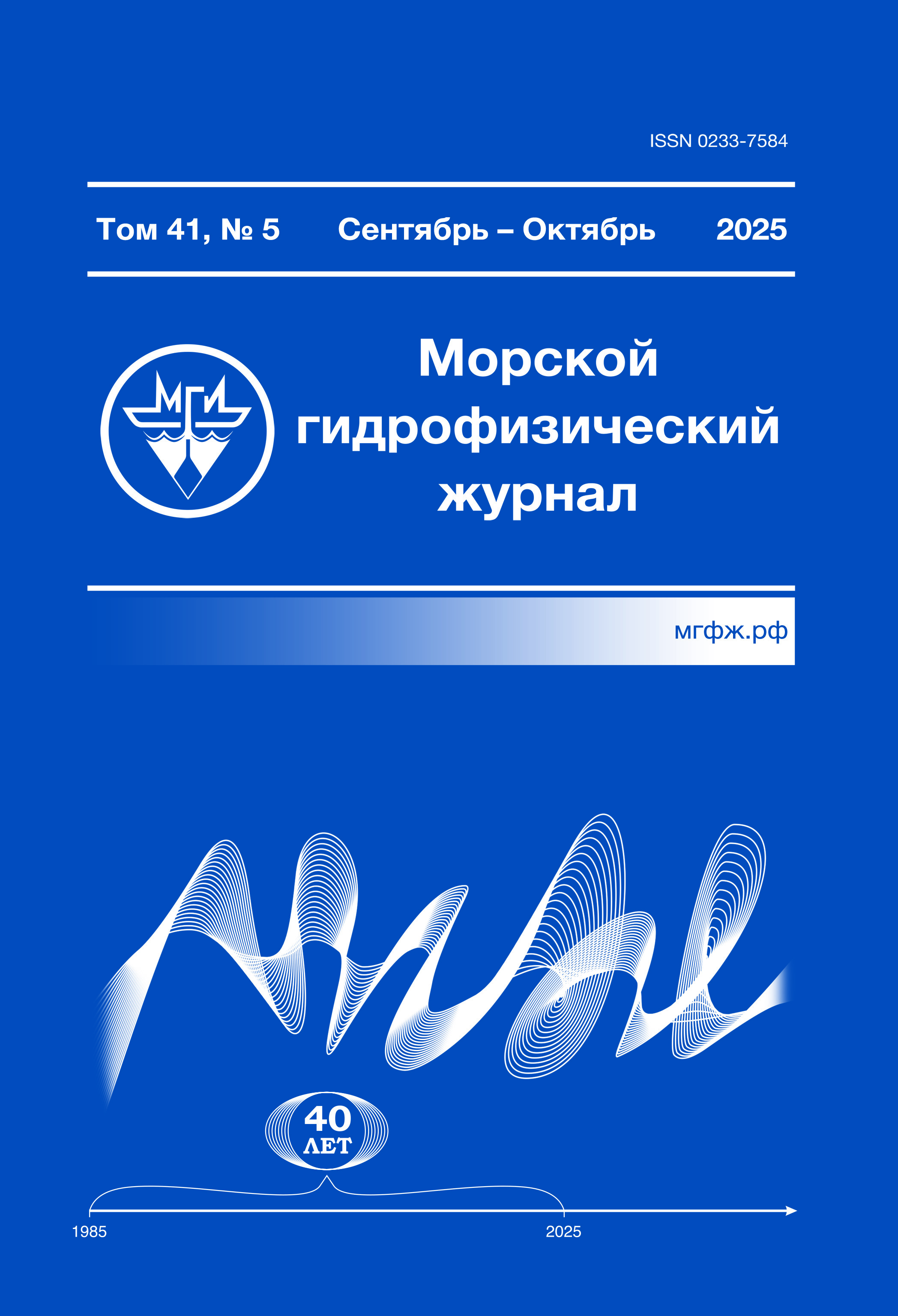from 01.01.1988 until now
Sevastopol, Sevastopol, Russian Federation
Purpose. The purpose of the study is to assess the vertical turbulent diffusion coefficient in the lower part of main pycnocline in the areas of continental slope and deep part of the Black Sea. Methods and Results. The data collected during the 87th cruise of R/V “Professor Vodyanitsky” which was conducted in the central sector of the northern Black Sea from June 30 to July 18 in 2016, are used. The profiles of temperature, salinity and current velocity were measured by CTD/LADCP probes. A method for applying the G03 parameterization to the ~ 200 m thickness layer located between the iso-pycns with conditional density 15.5 and 16.8 kg/m3 is proposed. To suppress measurement noise, the isopycnal averaging over the station ensemble as well as the approximation of the resulting parameter profiles by power functions are applied. The difference between the transfer functions of CTD and LADCP data processing is taken into account when integrating the canonical spectrum of internal waves. The data from 20 deep-sea stations permitted to obtain the buoyancy frequency profile averaged over the isopycns, which demonstrated the layers of its power and exponential dependences on depth. The methodological problems in applying the G03 parameterization to the lower part of the Black Sea main pycnocline are discussed in detail including the graphic presentation of data. The profiles of verti-cal turbulent diffusion coefficient show its almost constant value of ~ 210-6 m2/s in the region of continental slope and its linear increase with depth from 110-6 m2/s to 210-6 m2/s in the deep part of the sea. The maximum value of calculated heat fluxes reaches 12 mW/m2 and confirms their insignificant effect on the heating of cold intermediate layer. The salt flux at the layer upper boundary in the area of continental slope is 610-5 g/(m2s) and in the deep part of the sea – ~ 310-5 g/(m2s). At the layer lower boundary, the salt fluxes are almost the same for both areas and constitute ~ 510-6 g/(m2s). As for the shear-to-strain ratio, its sharp increase with depth is evident, and a significant difference in the nature of small-scale processes at the boundaries of lower part of the main pycnocline is clearly pronounced. Conclusions. The estimate of vertical turbulent diffusion coefficient obtained using the G03 parameteri-zation is in good agreement with the values resulted from the microstructural sounding in other sea re-gions. However, the issue of comparability of the estimates remains open and requires synchronous measurements with microstructural and CTD/LADCP probes.
Black Sea, main pycnocline, vertical turbulent mixing, Rim Current, current velocity shear, strain
1. Vliyanie dinamiki techeniy na gidrofizicheskuyu strukturu vod i vertikal'nyy obmen v deyatel'nom sloe Chernogo morya / A. G. Zacepin [i dr.] // Okeanologiya. 2007. T. 47, № 3. S. 327–339. EDN IAFSJJ.
2. Munk W. H. Abyssal recipes // Deep Sea Research and Oceanographic Abstracts. 1966. Vol. 13, iss. 4. P. 707–730. https://doi.org/10.1016/0011-7471(66)90602-4
3. Munk W. H., Anderson E. R. Notes on the theory of the thermocline // Journal of Marine Re-search. 1948. Vol. 7, iss. 3. P. 276–295.
4. Finescale parameterizations of turbulent dissipation / K. L. Polzin [et al.] // Journal of Geophys-ical Research: Oceans. 2014. Vol. 119, iss. 2. P. 1383–1419. https://doi.org/10.1002/2013JC008979
5. Turbulent diapycnal fluxes as a pilot Essential Ocean Variable / A. Le Boyer [et al.] // Frontiers in Marine Science. 2023. Vol. 10. 10:1241023. https://doi.org/10.3389/fmars.2023.1241023
6. Turbulence Across the Antarctic Circumpolar Current in the Indian Southern Ocean: Micro-Temperature Measurements and Finescale Parameterizations / Y. Sasaki [et al.] // Journal of Geophysical Research: Oceans. 2024. Vol. 129, iss. 2. e2023JC019847. https://doi.org/10.1029/2023JC019847
7. Takahashi A., Hibiya T. Assessment of Finescale Parameterizations of Deep Ocean Mixing in the Presence of Geostrophic Current Shear: Results of Microstructure Measurements in the Antarctic Circumpolar Current Region // Journal of Geophysical Research: Oceans. 2018. Vol. 124, iss. 1. P. 135–153. https://doi.org/10.1029/2018JC014030
8. Gregg M. C., Yakushev E. Surface ventilation of the Black Sea’s cold intermediate layer in the middle of the western gyre // Geophysical Research Letters. 2005. Vol. 32, iss. 3. L03604. https://doi.org/10.1029/2004GL021580
9. Vertikal'nyy turbulentnyy obmen v Chernom more: eksperimental'nye issledovaniya i modelirovanie / A. S. Samodurov [i dr.] // Morskoy gidrofizicheskiy zhurnal. 2023. T. 39, № 6. S. 735–759. EDN LCDZNK.
10. Podsputnikovyy poligon dlya izucheniya gidrofizicheskih processov v shel'fovo-sklonovoy zone Chernogo morya / A. G. Zacepin [i dr.] // Izvestiya Rossiyskoy akademii nauk. Fizika atmosfery i okeana. 2014. T. 50, № 1. S. 16–29. EDN RTOUUT. https://doi.org/10.7868/S0002351513060163
11. Podymov O. I., Zacepin A. G., Ostrovskiy A. G. Vertikal'nyy turbulentnyy obmen v Chernomorskom piknokline i ego svyaz' s dinamikoy vod // Okeanologiya. 2017. T. 57, № 4. S. 546–559. EDN ZCRXXJ. https://doi.org/10.7868/S0030157417040049
12. Podymov O. I., Zatsepin A. G., Ostrovskii A. G. Fine Structure of Vertical Density Distribution in the Black Sea and Its Relationship with Vertical Turbulent Exchange // Journal of Marine Science and Engineering. 2023. Vol. 11, iss. 1. 170. https://doi.org/10.3390/jmse11010170
13. Morozov A. N., Lemeshko E. M. Metodicheskie aspekty ispol'zovaniya akusticheskogo do-plerovskogo izmeritelya techeniy (ADCP) v Chernom more // Morskoy gidrofizicheskiy zhurnal. 2006. № 4. S. 31–48. EDN YOFQNN.
14. Gregg M. C., Sanford T. B., Winkel D. P. Reduced mixing from the breaking of internal waves in equatorial waters // Nature. 2003. Vol. 422. P. 513–515. https://doi.org/10.1038/nature01507
15. Dissipation Rate Estimates from Microstructure and Finescale Internal Wave Observations along the A25 Greenland–Portugal OVIDE Line / B. Ferron [et al.] // Journal of Atmospheric and Oceanic Technology. 2014. Vol. 31, iss. 11. P. 2530–2543. https://doi.org/10.1175/JTECH-D-14-00036.1
16. Microstructure Mixing Observations and Finescale Parameterizations in the Beaufort Sea / E. C. Fine [et al.] // Journal of Physical Oceanography. 2021. Vol. 51, iss. 1. P. 19–35. https://doi.org/10.1175/JPO-D-19-0233.1
17. Validation Finescale Parameterizations for the Eastern Arctic Ocean Internal Wave Field / T. M. Baumann [et al.] // Journal of Geophysical Research: Oceans. 2023. Vol. 128, iss. 11. e2022JC018668. https://doi.org/10.1029/2022JC018668
18. Henyey F. S., Wright J., Flatté S. M. Energy and action flow through the internal wave field: An eikonal approach // Journal of Geophysical Research: Oceans. 1986. Vol. 91, iss. C7. P. 8487–8495. https://doi.org/10.1029/JC091iC07p08487
19. Polzin K. L., Toole J. M., Smith R. W. Finescale Parameterizations of Turbulent Dissipation // Journal of Physical Oceanography. 1995. Vol. 25, iss. 3. P. 306–328. https://doi.org/10.1175/1520-0485(1995)025<0306:FPOTD>2.0.CO;2
20. Morozov A. N., Man'kovskaya E. V. Harakteristiki pridonnogo konvektivnogo sloya Cher-nogo morya po naturnym dannym (iyul' 2016 goda) // Morskoy gidrofizicheskiy zhurnal. 2022. T. 38, № 5. S. 548–561. https://doi.org/10.22449/0233-7584-2022-5-548-561
21. Ivanov V. A., Belokopytov V. N. Okeanografiya Chernogo morya. Sevastopol', 2011. 212 s.
22. Morozov A. N., Man'kovskaya E. V. Prostranstvennye harakteristiki holodnogo prome-zhutochnogo sloya Chernogo morya letom 2017 goda // Morskoy gidrofizicheskiy zhurnal. 2021. T. 37, № 4. S. 436–446. EDN BCSYUB. https://doi.org/10.22449/0233-7584-2021-4-436-446
23. Stanev E. V., Chtirkova B., Peneva E. Geothermal Convection and Double Diffusion Based on Profiling Floats in the Black Sea // Geophysical Research Letters. 2021. Vol. 48, iss. 2. e2020GL091788. https://doi.org/10.1029/2020GL091788
24. Samodurov A. S. Vzaimodopolnyaemost' razlichnyh podhodov dlya ocenki intensivnosti vertikal'nogo turbulentnogo obmena v estestvennyh stratificirovannyh basseynah // Morskoy gidrofizicheskiy zhurnal. 2016. № 6. S. 37–48. EDN XGXULL. https://doi.org/10.22449/0233-7584-2016-6-37-48
25. Garrett C., Munk W. Space-time scales of internal waves: A progress report // Journal of Geo-physical Research. 1975. Vol. 80, iss. 3. P. 291–297. https://doi.org/10.1029/JC080i003p00291
26. Cairns J. L., Williams G. O. Internal wave observations from a midwater float, 2 // Journal of Geophysical Research. 1976. Vol. 81, iss. 12. P. 1943–1950. https://doi.org/10.1029/JC081i012p01943
27. Morozov A. N. Vertikal'noe peremeshivanie v osnovnom piknokline Chernogo morya v letniy sezon // Morskoy gidrofizicheskiy zhurnal. 2025. T. 41, № 3. S. 251–263. EDN POFJIH.
28. Global Abyssal Mixing Inferred from Lowered ADCP Shear and CTD Strain Profiles / E. Kunze [et al.] // Journal of Physical Oceanography. 2006. Vol. 36, iss. 8. P. 1553–1576. https://doi.org/10.1175/JPO2926.1
29. Gregg M. C. Scaling turbulent dissipation in the thermocline // Journal of Geophysical Re-search: Oceans. 1989. Vol. 94, iss. C7. P. 9686–9698. https://doi.org/10.1029/JC094iC07p09686
30. Fer I. Scaling turbulent dissipation in an Arctic fjord. // Deep Sea Research Part II: Topical Studies in Oceanography. 2006. Vol. 53, iss. 1–2. P. 77–95. https://doi.org/10.1016/j.dsr2.2006.01.003
31. Chinn B. S., Girton J. B., Alford M. H. The Impact of Observed Variations in the Shear-to-Strain Ratio of Internal Waves on Inferred Turbulent Diffusivities // Journal of Physical Ocean-ography. 2016. Vol. 46, iss. 11. P. 3299–3320. https://doi.org/10.1175/JPO-D-15-0161.1
32. Cirkulyaciya vod i harakteristiki raznomasshtabnyh techeniy v verhnem sloe Chernogo morya po drifternym dannym / V. M. Zhurbas [i dr.] // Okeanologiya. 2004. T. 44, № 1. S. 34–48. EDN OWJSRJ.
33. Seasonal Variability of Near-Inertial Internal Waves in the Deep Central Part of the Black Sea / E. Khimchenko [et al.] // Journal of Marine Science and Engineering. 2022. Vol. 10, iss. 5. 557. https://doi.org/10.3390/jmse10050557
34. Khimchenko E., Ostrovskii A. Observations of Near-Inertial Internal Waves over the Continental Slope in the Northeastern Black Sea // Journal of Marine Science and Engineering. 2024. Vol. 12, iss. 3. 507. https://doi.org/10.3390/jmse12030507
35. Morozov A. N., Man'kovskaya E. V., Fedorov S. V. Inercionnye kolebaniya v severnoy chasti Chernogo morya po dannym naturnyh nablyudeniy // Fundamental'naya i prikladnaya gidrofizika. 2021. T. 14, № 1. S. 43–53. EDN UCLNDV. https://doi.org/10.7868/S2073667321010044


















